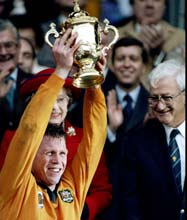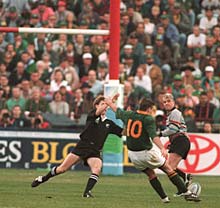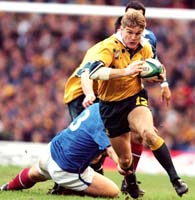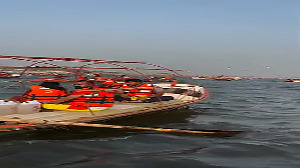Brief history of the four World Cup finals.
1987: New Zealand 29 France 9
New Zealand, uncompromising and relentlessly efficient, had looked 20 points better than any of their opponents throughout the first World Cup which they jointly hosted with Australia.
| |||||||||||
John Kirwan was fast, direct and a deadly finisher on the wing, Buck Shelford a force of nature at number eight and Michael Jones already the finest open side flanker in the world.
In addition, Sean Fitzpatrick was an immensely promising hooker at the start of a career which would lead to the All Black captaincy. Flyhalf Grant Fox, an underrated player, directed play astutely and kicked a record goal tally.
France came to the tournament as champions of Europe and defeated Australia in a Sydney semi-final which proved one of the great rugby matches. They had Serge Blanco at fullback, scorer of the winning try in Sydney, and Philippe Sella at centre behind a tough, abrasive pack.
Unfortunately for the French it soon became clear at Auckland's Eden Park that the final was a match too far.
Lacking the spark and inspiration of Sydney, they trailed 9-0 at halftime after a Jones try. Jones then made the break which led to a try by captain and scrumhalf David Kirk while Kirwan sprinted away for his eighth try of the tournament. Fox kicked the remaining points.
After the match a British journalist asked the boyish Kirk if the game had been worthy of a World Cup final. "You really make me laugh," replied the future Rhodes scholar showing no signs of mirth. "That was a test match out there."
- - - -
1991: Australia 12 England 6
Shelford succeeded Kirk as All Blacks captain and under his leadership New Zealand played some wondrous rugby. But after he was unexpectedly axed, New Zealand began to lose their way.
Their team was widely perceived as arrogant and unfriendly and all the neutrals cheered when they were decisively beaten in the semi-final in Dublin by Australia.
 Captained by Nick Farr-Jones, Australia had developed into a great side with a magician in David Campese on the wing, the cerebral Michael Lynagh at flyhalf and a wonderful centre pair in Tim Horan and Jason Little. Lock John Eales and flanker Simon Poidevin were the pick of a big, mobile pack.
Captained by Nick Farr-Jones, Australia had developed into a great side with a magician in David Campese on the wing, the cerebral Michael Lynagh at flyhalf and a wonderful centre pair in Tim Horan and Jason Little. Lock John Eales and flanker Simon Poidevin were the pick of a big, mobile pack.
England had rebounded after an ignominious quarter-final exit in 1987 to become the best side in Europe, winning the grand slam and dismissing France in the quarter-finals. Their team was based on a big, powerful pack and the right boot of flyhalf Rob Andrew.
Unexpectedly, the home side tried to run the ball in the final through classy outside backs Jeremy Guscott, Will Carling and Rory Underwood. But it proved too late to switch game plans and Australia scored the only try of the match through prop Tony Daly after the pack drove over the line.
Campese, hero of the Dublin semi-final after a searing early try, was a villain to the Twickenham crowd who believed he had deliberately knocked on a pass intended for Underwood who was in the clear.
- - - -
1995: South Africa 15 New Zealand 12
South Africa had suffered more than they had thought in the years of apartheid isolation and in the early stages of the 1995 tournament before their home crowds they often looked ponderous and slow-witted. Still they defeated Australia in their opening match and edged France in a semi-final played on a virtual lake.
By contrast, the All Blacks had dazzled and delighted with their exuberant back play complementing an experienced and seasoned pack. In particular, they had the hulking giant Jonah Lomu, who scored four tries in the semi-final demolition of England.
It seemed appropriate that the two great rugby nations of the 20th century should meet in the final at Ellis Park, Johannesburg.
 New Zealand had clearly been the team of the tournament but on June 24 the force was with South Africa once President Nelson Mandela, in a master stroke of public relations, arrived at the match wearing a Springbok jersey.
New Zealand had clearly been the team of the tournament but on June 24 the force was with South Africa once President Nelson Mandela, in a master stroke of public relations, arrived at the match wearing a Springbok jersey.
The All Blacks, who later said they had been affected by food poisoning, seemed to be forcing the pace too hard in an effort to get the ball to Lomu. Once he was marked out of the game, they appeared to have no alternative.
A unrelenting defensive battle depended ultimately on the boots of opposing flyhalves Joel Stransky for South Africa and Andrew Mehrtens for New Zealand.
With the score tied at 9-9, the match went into extra time between two desperately tired teams. Mehrtens kicked a long penalty, Stransky levelled then, with seven minutes to play, Stransky struck a second drop goal in the face of a desperate Mehrtens charge.
- - - -
1999: Australia 35 France 12
Defence, good and bad, was the story of the last World Cup staged in the British Isles and France.
Under Eales the Wallabies conceded only one try as they reached the final against France at the Millennium Stadium in Cardiff.
New Zealand, their projected final opponents, led France 24-10 at Twickenham before the defence disintegrated and the French recorded a famous 43-31 win.
 For the Wallabies, Horan had been supreme in the midfield and the deceptively languid Stephen Larkham had orchestrated the team from flyhalf.
For the Wallabies, Horan had been supreme in the midfield and the deceptively languid Stephen Larkham had orchestrated the team from flyhalf.
Eales was a colossus at lock and Toutai Kefu was equally influential among the forwards.
As they had in 1987, France had little left after their semi-final heroics and the match was a drab affair with Owen Finnegan and Ben Tune scoring tries.
Australia become the first team to win the Cup twice on the day Australia held a referendum to decide if it was to become a republic. Thee nation decided in favour of the royalists. Eales, a republican, received the William Webb Ellis trophy from the Queen.








 © 2025
© 2025